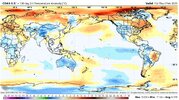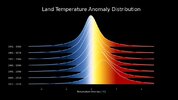The residence time of an average CO2 molecule in the atmosphere is on the order of several years-decades, whereas a lighter-than-average-air gas like water vapor is on the order of hours-several days because it precipitates in out very quickly (but is also replenished just as fast), so this argument about atomic weight really doesn't hold up. On the other hand, a large proportion say half of a half (~25%) of what we emit today will remain in the atmosphere several times longer than the average molecule, etc.
The half life of CO2 varies a lot depending on the source you look at but, the decay process is very exponential & non-linear because there are many physical mechanisms acting simultaneously at vastly different rates. CO2 absorption (at least initially via plants) occurs rapidly on land (months-years), the processes to absorb CO2 are very slow in the ocean, on the order of centuries (& made more slow by the fact that the ocean is warming, which decreases the solubility of dissolved CO2), & the act of carbon sequestration through interaction w/ calcium carbonate in the weathering of rocks is on the order of tens of thousands of years. Barring a huge unforeseen catastrophe &/or without major intervention from humans to sequester carbon back to where it came from (which we are fully capable of doing), we almost certainly won't see CO2 levels return to pre-industrial era levels for tens-hundreds of thousands of years.
I generally tend to agree with this statement here:
https://www.nature.com/articles/climate.2008.122
“About 50% of a CO2 increase will be removed from the atmosphere within 30 years, and a further 30% will be removed within a few centuries. The remaining 20% may stay in the atmosphere for many thousands of years.”
Let's also just get something straight here, climate change isn't really about the actual temperatures themselves, & whether or not it was actually warmer or cooler at some distant time in Earth's past. Rather, the actual problem is
rate of change we're imposing on the climate system thru the release of fossil fuels & the positive feedbacks that come with it to accentuate this change. Humans and other animal species on this planet are creatures of habit, and if the climate were to either warm
or cool in a dramatic way, it forces
all of us to either quickly adapt or perish, which is a very costly endeavor, particularly in the long run.




